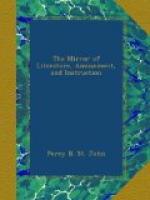Soon from this work returning tir’d
and lean,
More tann’d than though you’d
twenty summers seen,
The wonted gard’ning tools again
you’d take
Your long-accustom’d shovel and
your rake;
And then exclaiming, you would surely
say,
’Twere better far to labour many
a day
Than e’er attempt to take such useless
flights,
And vainly strive to gain poetic heights,
Impossible to reach—I might
as soon
Ascend at once and land upon the moon!
Come, Anthony, attend: let me explain
(Although an idler) weariness and pain.
Man’s ever rack’d and restless,
here below,
And at his best estate must labour know.
Then comes fatigue. The Sisters nine
may please
And promise poets happiness and ease;
But e’en amidst those trees, that
cooling shade,
That calm retreat for them expressly made,
No rest they find—there rich
effusions flow
In all the measures bardic numbers know:
Thus on their way in endless toil they
move,
And spend their strength in labours that
they love.
Beneath the trees the bards the muses
haunt,
And with incessant toil are seen to pant;
But still amidst their pains, they pleasure
find
An ample entertainment for the mind.
But, after all, ’tis plain enough
to me,
A man unstudious, must unhappy be;
Who deems a dull, inactive life the best,
A life of laziness, a life of rest;
A willing slave to sloth—and
well I know,
He suffers much who nothing has to do.
His mind beclouded, he obscurely sees,
And free from busy life imagines ease.
All sinful pleasures reign without control,
And passions unsubdued pollute the soul;
He thus indulges in impure desires,
Which long have lurk’d within, like
latent fires:
At length they kindle—burst
into a flame
On him they sport—sad spectacle
of shame.
Remorse ensues—with every fierce
disease.
The stone and cruel gout upon him seize;
To quell their rage some fam’d physicians
come
Who scarce less cruel, crowd the sick
man’s room;
On him they operate—these learned
folk,
Make him saw rocks, and cleave the solid
oak;[8]
And gladly would the man his fate resign
For such an humble, happy state as thine.
Be thankful, Anthony, and think with me,
The poor hardworking man may happier be
If blest with strength, activity, and
health,
Than those who roll in luxury and wealth.
Two truths important, I proceed to tell,
One is a truth, you surely know full well;
That labour is essential here below
To man—a source of weal instead
of woe:
The other truth, few words suffice to
prove,
No blame attaches to the life I love.
So still attend—but I must
say no more,
I plainly see, you wish my sermon o’er;
You gape, you close your eyes, you drop
your chin,
Again methinks I’d better not begin.




